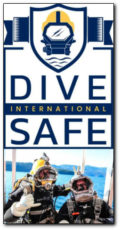Court Decision Confirms Criminal Liability for Supervisors – What It Means for Our Industry
By CADC Admin ~ April 24th, 2025. Filed under: Latest Diving News, Law.

(This is a public service announcement from the CADC to all diving contractors – April 20 2025)
A recent legal decision out of New Brunswick Feb 2025 has major implications for all of us in the commercial diving sector as well as any industrial or commercial construction industry. Don’t ignore the warning.
In King v. R., 2025 NBCA 12e, the New Brunswick Court of Appeal upheld a criminal negligence conviction against a worksite supervisor after the death of an 18-year-old worker. The supervisor, who failed to follow basic confined space safety protocols, was sentenced to three years in prison. His actions—or more accurately, his inaction—cost a young worker his life.
This decision wasn’t about fines. It wasn’t about policy violations. It was about criminal accountability under Bill C-45—Canada’s Westray Law. And for anyone directing high-risk work like commercial diving, the message could not be clearer: if you neglect safety and someone dies, you may go to jail.
What Happened and Why It Matters
In the King case, a leak test was conducted in an 8-foot confined space while a young worker remained inside. No hazard assessment was done. No emergency plan was in place. No confined space procedures were followed. The supervisor didn’t read the equipment’s safety manual. He never warned the worker the space was going to be flooded. The result was fatal.
The court ruled this was a marked and substantial departure from what a reasonable supervisor would have done. They confirmed that a “common sense” hazard like flooding a confined space during a leak test was enough to establish criminal negligence.
Let’s be clear—this could have easily occurred in a commercial diving context: confined space entries, pipeline work, tanks, lockout-tagout failures, inadequate supervision, or improperly briefed divers. The parallels are unmistakable.
What This Means for ALL DIVING CONTRACTORS
This case sends a message to supervisors and employers across Canada—the courts are prepared to impose jail sentences when safety is ignored. In the diving industry, where hazards are immediate and often life-threatening, we must assume the legal threshold is even higher.
In the case of CADC members, we are expected to meet—and in many cases exceed—the safety standards laid out in CSA Z275.2 and Z275.4. These are not just best practices—they are often incorporated directly into law. Courts will judge our actions against these standards if things go wrong.
What You Need to Do Now
For CADC Contractors – and Dive Contactors in general – and Supervisors:
- Train and certify all supervisors to meet CSA Z275.4. This is non-negotiable. Being “experienced” is not enough. Formal training matters.
- Conduct proper hazard assessments for all dive operations—especially those involving confined spaces or hazardous conditions.
- Follow CSA Z275.2 to the letter as a minimum safety policy. This includes proper crew sizes, equipment checks, emergency procedures, dive plans, and documentation.
- Document everything. If there’s no paper trail—no logs, no plans, no hazard forms—it didn’t happen in the eyes of the court.
- Reinforce a culture of safety. Encourage your divers and tenders to raise concerns. Give them the power to speak up—and act on it.
For Clients Who Hire CADC Members and ANY diving Contractor:
- Hire only qualified, CSA-compliant contractors. CADC members are required as a condition or membership to follow CSA Dive Standards as a minimum. If a diver is hurt on your site and you hired based on cost over competence, you may share liability.
- Ask for credentials and safety plans. Require that your contractor follows CSA standards and provide written confirmation of their procedures.
- Support safe operations. That means allowing time for safety assessments and giving the contractor the room to plan properly. Don’t rush the job.
Bottom Line
King v. R. wasn’t about policy. It was about accountability. The case proved that criminal negligence laws under Bill C-45 apply to supervisors and companies who ignore known risks.
In our industry, we are often dealing with confined space entries, delta P, unstable environments, heavy lifting, and pressure systems. If a diver is hurt or killed because a hazard was ignored, the legal consequences can be catastrophic—for the supervisor, the employer, and potentially the client.
Don’t assume this can’t happen to you or your team. Now is the time to act:
- Review your operations
- Verify your training
- Reaffirm your safety culture
- And above all—put safety first every single time.






